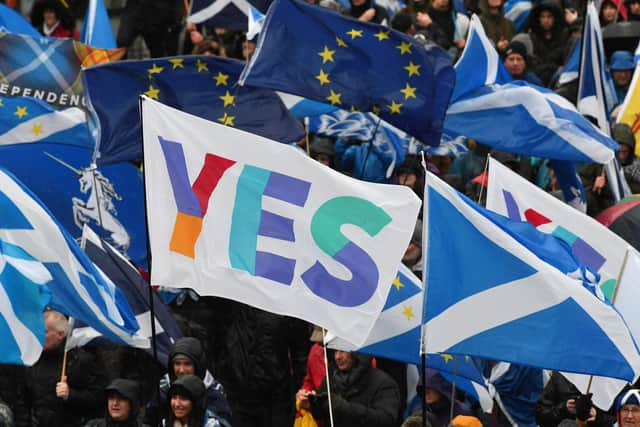Scottish independence: YouGov poll shows same Yes result as 2014 referendum
YouGov’s poll for The Times found the same headline result as the 2014 Scottish independence referendum.
It comes on the day that Nicola Sturgeon became Scotland’s longest-serving First Minister, overtaking her predecessor Alex Salmond.


Advertisement
Hide AdAdvertisement
Hide AdMs Sturgeon has now served seven years and five days in the role, beginning after Mr Salmond stepped down in the wake of the 2014 referendum.
YouGov polled 1,115 Scottish adults between May 18 and May 23.
It found support for independence at 38 per cent, support for remaining in the union at 46% and “don’t know” on 11 per cent.
The poll also found 59 per cent are opposed to having a referendum before the end of 2023 while 28 per cent were in favour.
The SNP plan to have another vote on the constitutional question by the end of next year.
However, 42 per cent of people were in favour of having another referendum within the next five years, with 41 per cent opposed.
Scots were also polled on their Westminster voting intention.
The SNP were on 46 per cent, Labour on 22 per cent, the Conservatives on 19 per cent, the Lib Dems on 6 per cent and the Greens on 3 per cent.
Advertisement
Hide AdAdvertisement
Hide AdMs Sturgeon’s approval rating was a net positive, with 51 per cent saying she was doing well and 42 per cent saying she was doing badly.
Boris Johnson’s was negative, with 17 per cent saying he was doing well and 78 per cent saying he was doing badly.
Among Holyrood’s other parties, Anas Sarwar had a net positive approval rating with 35 per cent saying he was doing well and 30 per cent badly.
For Douglas Ross, 18 per cent said he was doing well and 55 per cent said he was doing badly.
Elections expert, Professor Sir John Curtice, said the First Minister would soon need to try and win over more Scots to her constitutional vision.
He told The Times: “Caution was arguably a key feature of Ms Sturgeon’s handling of the pandemic.
“But at the same time, undue caution is an accusation that has been levelled against her by the more impatient supporters of independence.
“But if her handling of the pandemic is not to prove the one and only achievement for which her time as First Minister is remembered after she vacates Bute House, she will soon need to strike out and try and persuade her fellow Scots of the merits of the vision that brought her into politics – a vision for which there is seemingly still not majority support.”
Advertisement
Hide AdAdvertisement
Hide AdAnalysis of the Westminster results by Prof Curtice said they would translate into 53 seats for the SNP, three for the Scottish Conservatives, two for the Lib Dems and one for Scottish Labour.
Pamela Nash, chief executive of pro-union organistaion Scotland in Union, said: “Throughout her tenure as Scotland’s longest serving first minister, Nicola Sturgeon has been obsessed about separation and another divisive referendum – but the people of Scotland don’t agree with her.
“She promised that closing the education attainment gap would be her top priority, yet she has now abandoned that pledge.”
Comments
Want to join the conversation? Please or to comment on this article.
